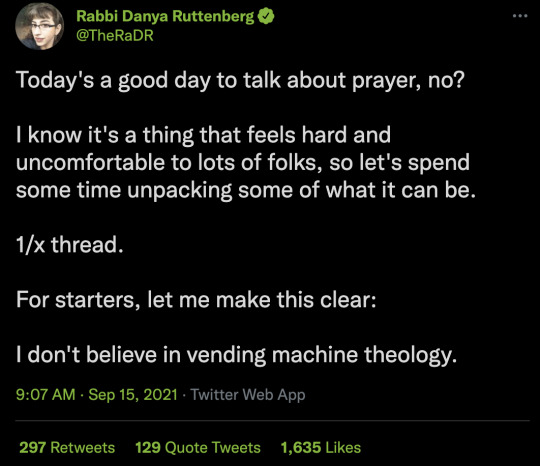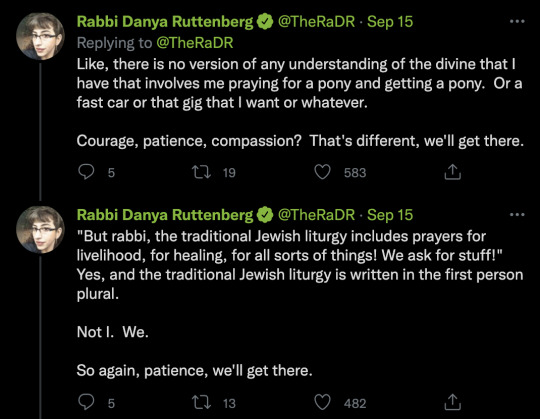#Rabbi Ruttenberg wrote this for Yom Kippur in particular and from her Jewish lens
Photo


id: the start of a twitter thread by Rabbi Danya Ruttenberg @TheRaDR from Sept 15 2021 reading,
Today's a good day to talk about prayer, no?
I know it's a thing that feels hard and uncomfortable to lots of folks, so let's spend some time unpacking some of what it can be.
1/x thread.
For starters, let me make this clear:
I don't believe in vending machine theology. Like, there is no version of any understanding of the divine that I have that involves me praying for a pony and getting a pony. Or a fast car or that gig that I want or whatever.
Courage, patience, compassion? That's different, we'll get there. "But rabbi, the traditional Jewish liturgy includes prayers for livelihood, for healing, for all sorts of things! We ask for stuff!" Yes, and the traditional Jewish liturgy is written in the first person plural.
Not I. We.
So again, patience, we'll get there. / end id]
The thread continues,
But first, I want to say a few things about the act of prayer.
The Book of Samuel talks about a woman named Hannah who's stuck in a dark place; she finally breaks, starts crying, and then, the book tells us, she "increased her prayers before God…. Hannah spoke on her heart." She's considered the paragon of prayer in Judaism; she didn't recite formal liturgy. She teaches us, though, that prayer is about speaking on your heart.
It's a means to express something of our deepest selves, and not only naming it, but offering it up to the great beyond.
Whether or not you think of yourself as someone who believes in whatever might be called God, I'd like to suggest that there is power to this. I don't think you need to know to whom or what you're praying in order to pray.
Sometimes, you can just... pray. And see how it feels. If meditation can get us centered in the present moment, prayer can engage that presence, draw from or offer it up, or do both at the same time. Meditation is the work of the breath, of the stillness of the mind.
Prayer is, as the Jewish tradition puts it, "work of the heart." This work of the heart often emerges from the hardest spaces. Sometimes it comes out of that moment when you're at the edge of your ability to cope, or grief, despair, fear, anger, disassociated numbness, or overwhelm. Or from a bunch of those things, all at once.
Perhaps our prayers are open expressions of resentment, desperation, hope, gratitude, wonder, frustration, questions, or many of the other things a person might feel when we're up to the ears in it. Perhaps something else. I don't know.
I can tell you that if you spend all of Yom Kippur yelling at God until you get to the place where the tears are, or yelling until you find a new truth that you hadn’t uncovered, that will be a day well spent.
Yes, you can yell at God, you can be angry at God, you can yell at I-don't-know-if-there's-God-or-what-but-I'm-gonna-yell. The God in which I believe can take it.
Jews, anyway, have a long, proud tradition of yelling at God. It's... kind of how we roll.
But real prayer doesn’t push aside hard feelings. Nor will it magically fix everything. It can help us to name what's happening, & to pour it out to the great transcendent beyond — to turn your isolated feeling into something that connects you, that binds you to something bigger.
It is this outward offering that turns "feeling feelings" into prayer: we don't just experience them, we offer them up, to someone, something. We say, “here, can you hold on to at least a tiny piece of this anger, frustration and despair for just a second?” We connect our heart to the great infinite everythingness, the gushing, pulsing stream of life within and around us. We reach out.
It's about tuning into that which interlinks us all, that which is present within and between us. Try lifting up the things in the deepest places of your heart and try to release them like you're letting the wind take a balloon. You don't have to even know whether anyone's taking them or what, just try to pull the words up and out.
So then, to get back to the words in the prayerbook. First of all, permission:
If you're in services and what's happening with the prayerbook and where you are with things isn't where your head is at, let me be hopefully not the first person to give you permission to just be where you are, tune out of the service and tune in to your heart, tune in to whatever's happening there, do that. If you do some real work there, you've done good.
The point is not to recite every word of the Yom Kippur liturgy while your heart cries for attention. No. And as for crying in services? Feel free to ask anyone from any of the shuls I've attended regularly since the late 90's (aka when I got Jewy) if I have ever been seen sobbing hysterically during prayer services. Uh. Yes, hi, here is your permission slip to cry if you need to.
Sometimes in the process of prayer you move stuff around and find true things and clear out some things and the true things come out through tears. That's OK. Sometimes life is so full and the only time you have time to be a certain kind of present is during prayer and so it turns out that's when you cry. That's OK.
So, then, back to the words in the prayerbook. Whether you're more comfortable in the Hebrew (and occasionally Aramaic) or English, or a bit of both —permission slip to pray from whichever side works best for you — the prayerbook is meant to be your guide through a process. The liturgy has been crafted very intentionally. It's the trail for your hike. It's meant to take you on a series of risings & fallings, openings & closings, peaks & valleys. The blessings before & after the S'hma, before & after the Amidah, where (on YK) the viduis are, etc. We talk about keva (fixed form) and kavvanah (intention) as the heart of Jewish prayer. Taking the intention, the heart stuff I've been talking about and binding it to the words in the prayerbook, and offering it up. It takes practice, sure, but if you're in services a bunch tonight and tomorrow, why not practice?
Find some of the words that catch you in particular and really...pray them? See what it feels like to find some words that you wouldn't think to just write yourself and pray those?
And then we get around to the genius of Jewish prayer. The ways it shapes you, like water gently shaping a rock. The number of times I have, in prayer, had to find the ways and meanings around words I wouldn't have, in my tiny, finite, ego-driven self, thought to write. The ways that we — not I, we — has worked itself into me. It's not about my own love or sorrow. My own fate or concern. The hike has taken me to vistas more profound and beautiful than I possibly could have imagined on my own.
And it's forced me to tap into pain and suffering greater than I wanted to, because that's part of the work, too That's OK. We. Us. In any case, I want to bless you with the opportunity to do some of the work of the heart — tonight, tomorrow, and any time after that.
In services, or just walking down the street, when you're with a cranky child, at any moment when you need to offer something up. Formal prayer — yes. And spontaneous prayer is valid, too. It was for Hannah, it is for you, too.
Offer something up. PS: some theological Qs can be addressed in this piece, though more Bible-focused. Viz prayer, some Jewish philosophers talk about prayer impacting the person praying, some talk about prayer impacting the divine, some a combination, you don’t have to pick.
#judaism#yom kippur#prayer#prayer tag#danya ruttenberg#other faiths tag#important#twitter#Rabbi Ruttenberg wrote this for Yom Kippur in particular and from her Jewish lens#and those are the primary lenses to read it through BUT it can be read wider too.#like she says -- anyone can do this form of prayer. even those who don't know who or what exactly they're praying to#Christians for instance can learn SO much from this -- the emphasis on communal prayer. on not treating god like a vending machine#long post
428 notes
·
View notes